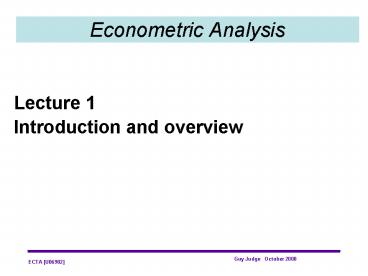Econometric Analysis PowerPoint PPT Presentation
1 / 8
Title: Econometric Analysis
1
Econometric Analysis
Lecture 1 Introduction and overview
2
Objectives
- To inform you about the aims and scope of the
unit - To explain the learning, teaching and assessment
arrangements - To review some of the basics of econometrics
covered in the Introduction to Econometrics unit - To review the use of PcGive for practical
econometrics work with an interactive example
3
Learning and teaching
- Lectures and accompanying notes
- Computer lab sessions
- Surgery and office hours
- Text books
- Web pages and links, Victory site and the L drive
- One minute e-mail and FAQs
4
Provisional Lecture Programme
Week Topic 1 Introduction and overview 2 A
review of single equation regression models for
cross-section data 3 Further aspects of
cross-section data econometric models 4
Regression models with time-series data 5 Further
aspects of time-series data econometric models 6
Testing for unit roots, Granger causality and
cointegration 7 Instrumental variables and
simultaneous equation models 8 More on
Instrumental variables and simultaneous equation
models 9 Limited dependent variables models 10
Pooled and panel data models 11 Review and
Revision
5
Recommended texts
- Main text
- Wooldridge, J M (2009) Introductory Econometrics.
A Modern Approach, South-Western CENGAGE Learning
4th edition (or alternatively the 3rd edition,
2006) - Other useful books include
- Dougherty, C (2007) Introduction to Econometrics,
Third Edition, OUP - Gujarati, D N (2002) Basic Econometrics, Fourth
Edition, McGraw-Hill - Kennedy, P (2003) A Guide to Econometrics, Fifth
Edition, Blackwell - And others available in the Library in section
330.0182
6
Assessment
- end of unit exam (50 weighting)
- two reports (25 weighting each) providing
extended analysis of some of the exercises
covered in the weekly practical classes
7
Section 1 (weeks 1-3) Wooldridge chapters 1-9
econometric models based on cross-section data
- a review of single equation econometric models
for cross-section data - standard classical assumptions relating to
independence of disturbances, homoskedasticity,
normality etc. - discussion of data issues quantitative and
qualitative variables proxies and dummies
dealing with missing data and outliers units of
measurement nominal, real, per capita data etc
multicollinearity and micronumerosity issues -
adjustment of data to create an X matrix with
suitable measurement properties - model formulation issues functional form,
transformations, a priori parameter assumptions
and possible restrictions (zero or exclusion
restrictions, other linear restrictions) - tests of restrictions (specification tests) and
diagnostic testing (misspecification tests)
Chow tests - the general to specific approach to modelling
a process for arriving at a model that is
congruent (theory-consistent, data admissible,
data coherent, encompassing and has predictive
validity)
8
Interactive illustration modelling variations
in wages in a cross-section data set
- The data set wage1 comprises observations on 24
variables for 540 individuals in the US in 1976,
drawn from the Current Population Survey (some of
these variables are just transformations of other
variables in the data set) - The data are available in two formats Excel
(wage1.xls) and the special PcGive format
(wage1.in7) - Variable definitions may be found in the file
wage1.des - We will use this file to discuss points on the
previous slide and to illustrate the use of
PcGive.

